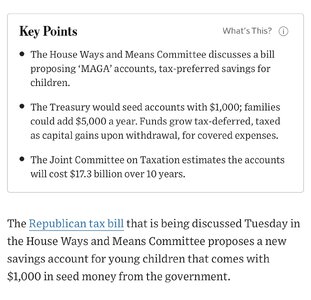heelinhell
Iconic Member
- Messages
- 1,922
looking like a bill giving to the rich and ignoring the hoi polloi
Follow along with the video below to see how to install our site as a web app on your home screen.
Note: This feature may not be available in some browsers.
The bill right now is bare bones. It's only 28 pages, mostly extensions of low-hanging Tax Cuts and Jobs Act provisions that are expiring. Expect to see amendments early next week that include the real meat. I think this is a case of keeping the substantive and politically fraught stuff out of eyesight until the last minute. In other words, stay tuned.looking like a bill giving to the rich and ignoring the hoi polloi
That was my takeaway, as well. That said, it suggests to me that many of the amendments to be offered will go down in flames and there will be no "Big Beautiful Bill" going to the Senate.The bill right now is bare bones. It's only 28 pages, mostly extensions of low-hanging Tax Cuts and Jobs Act provisions that are expiring. Expect to see amendments early next week that include the real meat. I think this is a case of keeping the substantive and politically fraught stuff out of eyesight until the last minute. In other words, stay tuned.
I think that is probably a safe bet. The margins are so narrow, the bill will regress toward the easiest version of itself, and I think you're right that that will look a lot like the 2017 TCJA extended.That was my takeaway, as well. That said, it suggests to me that many of the amendments to be offered will go down in flames and there will be no "Big Beautiful Bill" going to the Senate.
I'm guessing the Big Beautiful Bill coming out of the House will be little different from the 2017 tax bill that lined the pockets of the well to do and did nothing of substance to benefit working and middle class families.
That is one reason among many why the Treasury Secretary is urging Congress to raise the debt ceiling...I wonder if they realize a $500 increase in the child tax credit will add close to 30 Billion annually? Or that the increases in the standard deduction would add roughly another 30 Billion? Should be fun how the math works out for them.

 www.rawstory.com
www.rawstory.com
I think they already said it's up to Lindsey Graham and not the parliamentarian, essentially overruling her in advanceWill the Parliamentarian allow scoring on a current policy baseline? If not, will the Senate try to overrule her?
I hadn't seen that, but it looks like you're right.I think they already said it's up to Lindsey Graham and not the parliamentarian, essentially overruling her in advance

Just because Congress puts viewpoint discrimination into a law doesn't make it constitutional.“Tucked away on page 380 is a provision that would give the Trump administration a powerful new tool to silence dissent.
The provision would grant the Treasury Secretary the power to terminate the tax-exempt status of any nonprofit group they deem a "terrorist supporting organization." A "terrorist supporting organization" is any nonprofit that provides "material support" to a designated terrorist group. The term "material support" is broadly defined, and includes "any service," "expert advice," or "personnel" — regardless of whether that support is connected to violent acts. Nor is there any standard of evidence regarding what kind of information the Treasury Secretary can consider when deciding whether a nonprofit provided "material support."
The Treasury Secretary only needs to notify the nonprofit of the impending designation. They can decline to describe the "material support" the nonprofit allegedly provided if the Treasury Secretary decides "disclosure of such description would be inconsistent with national security or law enforcement interests."
The nonprofit would have 90 days to respond to the Treasury Secretary or challenge the designation in court. But it shifts the burden of proof onto the nonprofit to establish its innocence.
A similar provision passed the House as a standalone bill in November 2024 on a 219-184 vote. 15 Democrats and all but one Republican supported the bill, largely based on allegations that nonprofit groups were supporting Hamas after the October 7 attacks on Israel.”
~ Popular Information
